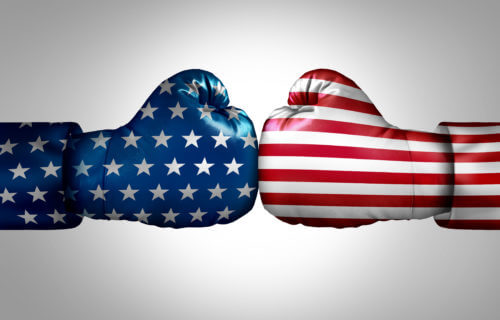EAST LANSING, Mich. — American politics have taken a distinctly discourteous turn over the past decade or so. However, this isn’t just an American phenomenon. Depending on your point of view, somewhat comforting (or concerning) research by a team from Michigan State University reports that political animosity is a global problem. Simply put, people all over the world can’t help but feel disdain for those belonging to opposing political parties.
While politics and party allegiances have always been a potentially explosive topic at American family dinners, office parties, and any number of other social gatherings, recent years have seen rates of rudeness and even apparent hatred toward those on the other end of the political spectrum skyrocket in the United States. Now, after analyzing six countries around the globe, scientists at MSU report affective polarization, or the tendency to dislike people with opposing political beliefs and favor others from one’s own party, is a global bias.
Moreover, researchers say their findings suggest that this dislike tends to strengthen when two people think about political issues in the same way yet come to different conclusions and different beliefs about those issues.
For example, two people from two separate political parties may agree that tax policy and trade should be thought of as a package deal. However, the researchers found that even though these two people share a way of thinking about political issues, they will also have the largest degree of affective polarization if they come to opposing conclusions. This indicates that sharing cognitive frameworks with political outgroups may actually intensify negative attitudes toward them.
“You can imagine how frustrating it is to interact with someone who seems to think about things in a similar way and who shares the same basic logic of how things work as you do, but yet come to opposite conclusions,” says Mark Brandt, an associate professor of psychology at MSU and a researcher in the field of social psychology, in a university release. “We think that sharing a way of thinking about issues with a political outgroup is likely a signal that they are competitors in the political system.”

This project, led by Felicity Turner-Zwinkels, a social psychologist from Tilburg University’s Department of Sociology, set out to examine the underlying factors that contribute to affective polarization. The findings suggest that across numerous countries, people tend to dislike political outgroups the more they disagree with them.
“This study matters because we examined a topic (affective polarization) that is heavily discussed and studied in America and brought it to a global scale. This shows that it is global and not just an American phenomenon,” Prof. Brandt explains. “People should care because it helps better explain the way humans interact with each other in the realm of politics.”
“Why do we dislike each other so much even when we think about an issue similarly? This helps explain it,” Prof. Brandt concludes. “This tells us that these feelings are widespread. Americans might think we’re special in our political entrenchment, but it turns out we’re not.”
Study authors add that their work also points to two potential interventions not directly tested that may help reduce affective polarization: highlighting shared opinions across political groups, and encouraging people to ponder political issues and their interconnectedness in new and unique ways.
The study is published in the Personality and Social Psychology Bulletin.
You might also be interested in:
- Political polarization in U.S. may be reaching an irreversible ‘tipping point’
- Heart-to-heart talks about politics don’t fix the divide between Democrats and Republicans
- Vexed voters: 8 in 10 Americans say politics are BIGGEST source of stress in life


Good. Countries will be so bound up in their own difficulties they’ll less often mess with us or expect us to solve their problems. Maybe we can deal with some of our own.
There are three primary reasons :
1) What should be evident from the studies on the backfire effect is you can never win an argument online. When you start to pull out facts and figures, hyperlinks and quotes, you are actually making the opponent feel as though they are even more sure of their position than before you started the debate. As they match your fervour, the same thing happens in your skull. The backfire effect pushes both of you deeper into your original beliefs.
Global Research Circa 2000.
2) Argument by ad hominem. America was/is the prime example of political argument not about policy, not about reality but about how crap your opponent is.
Snowflake ‘Never Trumpers’ v’s ‘Lock her up’ Deplorables
Trump asks Blacks “What do you have to lose?” and is called a racist for asking!
3)
“We stood up for what was right, we fought for moral reasons, we passed laws, struck down laws for moral reasons. We waged wars on poverty, not poor people. We sacrificed, we cared about our neighbors, we put our money where our mouths were, and we never beat our chest. We built great big things, made ungodly technological advances, explored the universe, cured disease, and we cultivated the world’s greatest artists and the world’s greatest economy. We reached for the stars, acted like men. We aspired to intelligence, we didn’t belittle it, it didn’t make us feel inferior. We didn’t identify ourselves by who we voted for in the last election, and we didn’t scare so easy.”
Newsroom “America is not the greatest any more.”
American TV has spread the infection to a major part of the English speaking world.
This animosity is planned :
A quote from a 1924 edition of the American Banker’s Association not intended for the public sums up what is currently happening all around us:
“Capital must protect itself in every possible way, both by combination and legislation. Debts must be collected, mortgages foreclosed as rapidly as possible. When, through the process of law, the common people lose their homes, they will become more docile and more easily governed through the strong arm of government applied by a central power of wealth under leading financiers. These truths are well known among our principal men who are now engaged in forming an imperialism to govern the world.
By dividing the voter through the political party system, we can get them to expend their energies in fighting for questions of no importance.
It is thus by discreet action we can secure for ourselves that which has been so well planned and so successfully accomplished.”
I repeat :
By dividing the voter through the political party system, we can get them to expend their energies in fighting for questions of no importance.